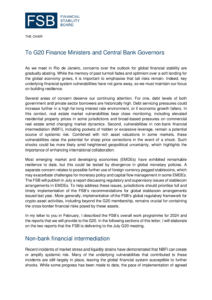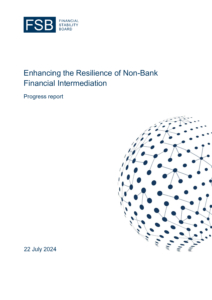Press enquiries:
+41 61 280 8477
[email protected]
Ref: 18/2024
In his letter to the G20, FSB Chair highlights high debt levels and vulnerabilities in non-bank financial intermediation (NBFI) as key risks to financial stability.
Chair notes many of the underlying vulnerabilities in NBFI are still in place.
FSB Chair also flags uneven progress in implementation of agreed NBFI policies and notes the need to finalise and implement these in a timely fashion.
The Financial Stability Board (FSB) today published a letter from its Chair, Klaas Knot, to G20 Finance Ministers and Central Bank Governors, ahead of the G20 meeting on 25-26 July.
In his letter, Mr Knot highlights historically high debt levels of both government and private sector borrowers and vulnerabilities in real estate markets and NBFI as areas that deserve continuing attention. These vulnerabilities raise the potential for sharp price corrections in the event of a shock, which could be more likely amid heightened geopolitical uncertainty and rich asset valuations in some markets. He calls for full implementation of the agreed G20 financial regulatory reforms to address these vulnerabilities.
The letter covers the two reports the FSB is delivering to the G20: a stocktake on regulatory and supervisory initiatives related to the identification and assessment of nature-related financial risks, which was published last week; and the FSB’s annual progress report on its work to enhance resilience in NBFI, delivered together with the letter.
The letter notes that many of the underlying vulnerabilities that contributed to stress in the NBFI sector during recent market incidents are still largely in place. The NBFI progress report highlights a number of challenges hampering progress, including data challenges that impede a full assessment of NBFI vulnerabilities and the formulation of effective policy responses.
Addressing leverage-related vulnerabilities in NBFI is a key area of current policy focus, and the FSB expects to publish by the end of 2024 a consultation report with proposed policy solutions. The FSB continues to monitor and analyse NBFI vulnerabilities on an ongoing basis through the development of additional metrics and analytical tools, as well as through targeted deep dives in specific areas, including solvency and liquidity risks in an environment of rising interest rates, and vulnerabilities in private credit.
The report also outlines further work that will help the FSB determine whether collectively the reforms, once implemented by jurisdictions, have sufficiently addressed systemic risk in NBFI.
Notes to editors
The FSB published in November 2020 a Holistic Review of the March Market Turmoil, which laid out a comprehensive and ambitious work programme for strengthening the resilience of the NBFI sector while preserving its benefits. This work is being carried out within the FSB as well as by its member standard-setting bodies and international organisations, to ensure that relevant experiences and perspectives are brought to bear.
The stocktake on regulatory and supervisory initiatives related to the identification and assessment of nature-related financial risks was conducted by the FSB at the request of Brazilian G20 Presidency. The stocktake draws on a survey of participating FSB members and the work done by international organisations on nature-related risks.
The FSB coordinates at the international level the work of national financial authorities and international standard-setting bodies and develops and promotes the implementation of effective regulatory, supervisory, and other financial sector policies in the interest of financial stability. It brings together national authorities responsible for financial stability in 24 countries and jurisdictions, international financial institutions, sector-specific international groupings of regulators and supervisors, and committees of central bank experts. The FSB also conducts outreach with approximately 70 other jurisdictions through its six Regional Consultative Groups.
The FSB is chaired by Klaas Knot, President of De Nederlandsche Bank. The FSB Secretariat is located in Basel, Switzerland and hosted by the Bank for International Settlements.

